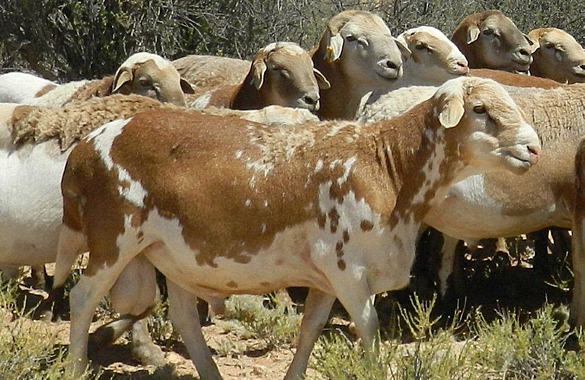

Sheep farming is not a common business in northern Uganda, perhaps due to the perception that it is not a profitable venture.
But at Got Apoli farm in Agung village, Anaka Sub-county, Nwoya District, a household that has incorporated commercial sheep farming have proved that the project is as profitable as rearing other livestock.
The farm is located about 10 kilometres off the Karuma-Packwach highway and borders Murchison Falls National Park.
It is ran by five brothers; Clement Lalobo, Jacob Omara, Lawrence Bongomin, Samuel Oola and Benedict Loum.
How they started
Oola, 37, had been working as an advocate at Anguria, Aogon & Co Advocate in Kampala, but he left his job to manage their farm.
He said they started rearing 11 local breed of goats in 2008 as a way of protecting their family land from grabbers.
“In 2008, there was rampant land grabbing in the area. As a way of protecting the land, the family decided to introduce livestock farming since we stay in different areas,” Oola explains.
He however noted that the little plan they had later blossomed into a big project.
A few months after, the brothers introduced 11 local and crossbreed sheep on the farm.
Today, Got Apoli Farm has 420 flocks of sheep, 360 herds of goats, reared on 200 hectares of land.
Benefits
According to Oola, proceeds from selling sheep and goats and its products have enabled them purchase mechanised farm equipment, which they intend to use for value addition.
He said they also installed a Shs1.3m bio-diesel condenser which in the near future would help in producing fuel for running machines on the farm.
Oola added that they were able to install a Shs1.5m solar power pump to harvest underground water.
Maintenance
He said the sheep and goats are kept together in a fenced pen and only released to graze in the bush for four hours daily.
“We keep them in pens to avoid challenges such as theft, diseases and torrential rains,” Oola said.
Oola said they have also invested Shs1.3 million in high yield grasses that they planted to boost meat production for their livestock.
To keep the animals safe from diseases, Oola says the farm has hired two veterinary doctors who visit regularly to administer treatment and medical checkups.
Labour
Oola said the farm has employed seven herdsmen, two security guards and two cooks. “We have 11 permanent workers,” he said.
Challenges
He said their biggest challenge has been wildlife, especially elephants and pythons that cross from the Murchison Falls National Park into their farm.
He added that diseases, especially bacterial infections affecting goats and sheep have made them spend about Shs500,000 every two weeks on treatment and medical checkups which he says is expensive.
Oola said poor road network and limited market for sheep in Nwoya District have slowed down expansion of their farm.
Future plans
Oola said they plan to extend the farm onto 1,000 hectares of land, turn it into a demonstration centre for agricultural mechanisation and introduce exotic cattle for meat and milk production.
The farm already has 192 herds of cattle.
He added that they also plan to introduce rearing sheep for wool production adding that they have already purchased 15 wool sheep which are on transit from Tanzania.
Advice
Oola advises both active and prospective farmers to venture into sheep rearing arguing that the project is profitable.
The Nwoya District, assistant veterinary officer Julius Oloya, said sheep rearing unlike other livestock such as goats and cows mature early adding that they are cheap to buy for one who intends to start the project.
He said a female sheep produces twice a year making multiplication of sheep on a farm much easier.
“It’s very easy to keep sheep. One can use an acre of land to keep between 15-20 sheep unlike cows that requires large land. Sheep can tolerate any weather condition,” says Oloya.
He said for one intending to start rearing sheep capital could range between Shs300,000 and Shs400, 000.
Diseases
According to Oloya sheep and goats are affected by the same types of diseases. He highlighted trypanosomiasis spread by tsetse flies, red water, East Coast Fever [ECF], Anaplasmosis, heart water, sweating sickness all spread by tick and orf, a viral disease.
He said tick borne diseases can be treated by regular spraying using acaracide while bacterial infections are treated by giving the animals antibiotics.
Why sheep
According to Oola, the fast rate of sheep reproduction, easy management, resilience to sickness and their traditional values to locals who use it for performing traditional rituals among other reasons prompted them to introduce sheep rearing. The brothers have mixed both the local and Dorper sheep, which they rear on a free range system.
Market
According to Oola, their proximity to Murchison Falls National Park, has offered them great ideas of getting market from tourists who visit the national park and Chinese nationals undertaking oil exploration in the Albertine Grabben.
“Mutton is a delicacy, we studied the market and realised Whites and Chinese love it so much. We decided to tap that market and reap from selling mutton,” Oola said.
He also noted that his clients come from Gulu, Amuru, Oyam, Arua and Nebbi districts.
Earnings
Oola said weekly, he sells between eight to 10 sheep to locals and foreign clients that earn the company Shs900,000 to Shs1.2 m. Each sheep costs between Shs80,000 to Shs120, 000.
He said goats are sold within Nwoya District between Shs70,000 to Shs100,000.
Monthly, the farm gets about Shs4.2m in earnings from selling livestock and livestock products.
Next Reading
Line breeding and Inbreeding in Rabbits
Line breeding is the process of breeding closely related animals, usually father to daughter or […]
Previous Reading
How Lakoi earns more from processing Honey
With the increasing demand of honey on the local market, many people are taking on […]
 Contact Jaguza Support
Contact Jaguza Support